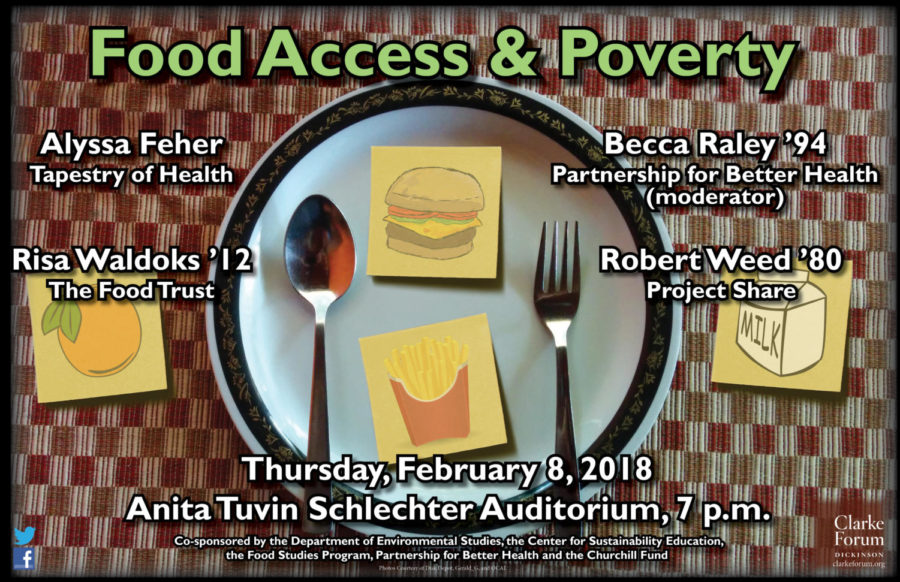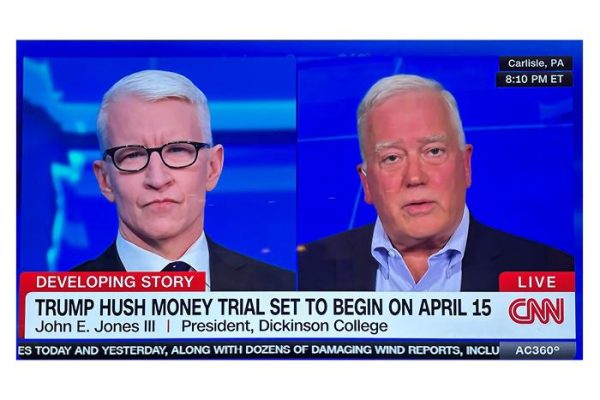Alumni Say Access Issues Lead to Hunger Problem
Dickinson alumni were among panelists who claimed that hunger in the United States is “not an abundance problem, it’s an access problem” at a Clarke Forum lecture last week.
Bob Weed ’80, interim-CEO of Project Share, concluded that food insecurity and poverty is “not an abundance problem, it’s an access problem.” Cheri Rousch, another panelist and “a local community resident” according to the Clarke Forum, followed up on this, saying “we have to talk about this as a community,” adding that “those that are most affected by [the food crisis] cannot speak for themselves” and “need us as a community to lift them up.”
Moderator Becca Raley ’94 asked questions of the four panelists, including Weed, Rousch, Risa Waldoks ’12 of The Food Trust National Campaign for Healthy Food Access and Alyssa Feher, of the Tapestry of Health WIC Program, such as “Why are these challenges so persistent?” To this Feher responded: “the cycle of poverty is difficult to come out of,” adding, “food insecurity goes along with [the poverty cycle].”
Waldoks added that even in times of a growing economy, there is the question of who the economy is growing for and who is stuck in persistent poverty. “There are so many intertwined pieces,” Waldoks said. He proceeded listing factors such as “housing, wages, and the criminal justice system” as some of the factors.
Raley talked about how political the question of food access is, sharing that “the U.S. Department of Agriculture reports that 96 percent of all food assistance is funded by the federal government … only four percent of food assistance comes from charitable food programs.” Because of the significant role the government plays, “there is a large national debate around how to best address hunger,” Raley noted.
“There are researchers,” she said, “who’ve argued that actually the work that charitable food systems are doing in communities are a part of the problem. They’ve contended that food drives and charitable giving and large corporate donations distract and divert us all … from addressing the real root issues of poverty, like economic inequality, wages, and family financial security.”
In response to this claim, Weed said that “expanding emergency food systems are one of the reasons we haven’t been more effective in solving the root issues in poverty.”
Weed explained “that income inequality and social justice issues [are] important, but … a student in school who comes from a family that struggles with hunger and food insecurity, shows significantly lower gains in reading, math, and science than their peer group. An employee who heads a family that struggles with hunger and food insecurity is less productive than their peer in the same job. … So while I applaud efforts to work on solving those problems, there are so many issues and so many factors that go into how we influence poverty and hunger and food insecurity, I would ask back, should we not take care of those folks now?”
Raley also asked how issues like hunger can be better addressed, to which Rousch responded by citing involvement in gardening and gleaning fresh foods. “During the growing season, the community has filled my needs as well as they’re going to be filled,” explained Rousch.
Espoir DelMain ’21 described the panel as “pretty powerful.” She, however, also stated that “to me the only way to sustainably solve these issues … is to listen to people most affected and with firsthand experience and give them power in creating the solutions as well as giving their voice a space that it might not usually have.” She further expressed that she did not appreciate the way the moderator “kept interrupting and cutting [off Rousch].”
Abby Israel ’20 thought that the Clarke Forum “did a really great job of getting speakers from all walks of food insecurity management. Hunger is an issue that I’ve been researching and volunteering with for a very long time so it was nice to see the Clarke Forum put on an event that faced it head on.”
The Food Access & Poverty lecture was held on Thursday, Feb. 8. The event was as part of the Clarke Forum’s Leadership in an Age of Uncertainty Series.




